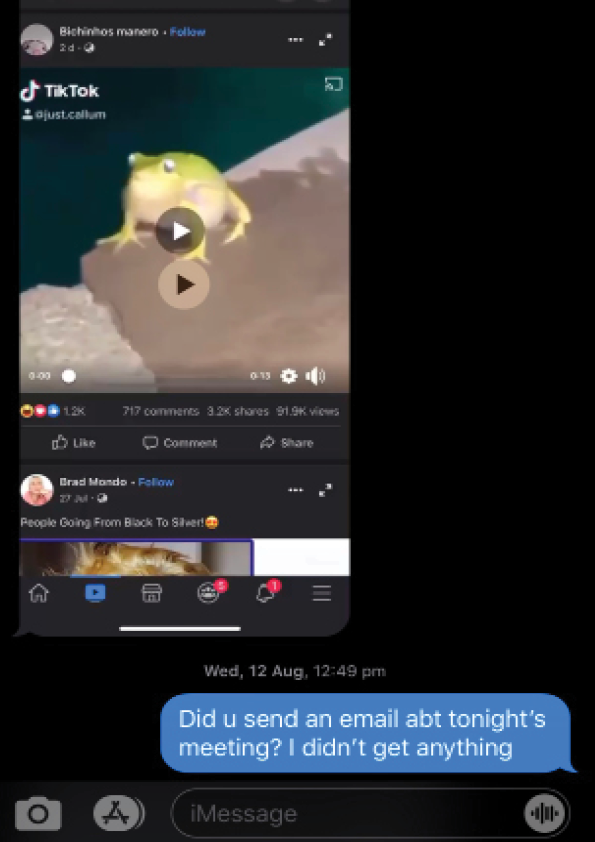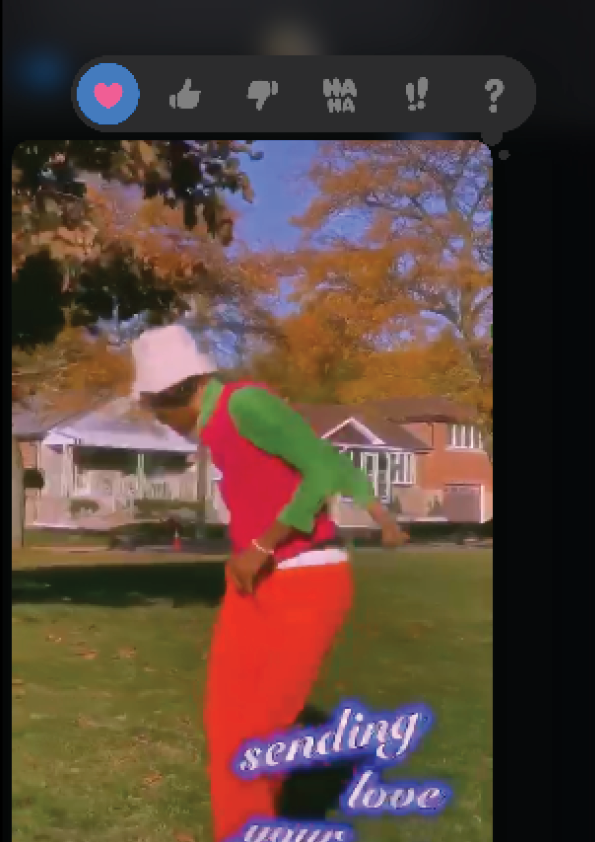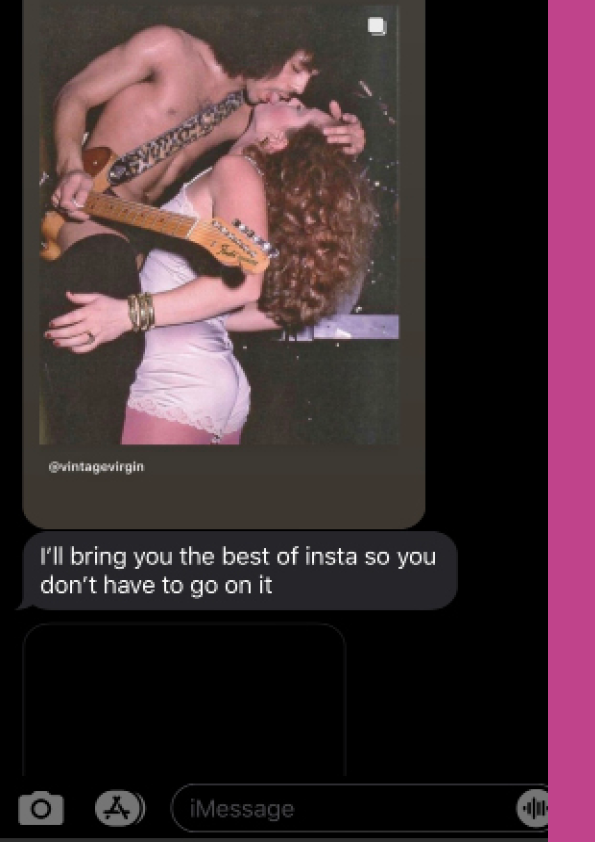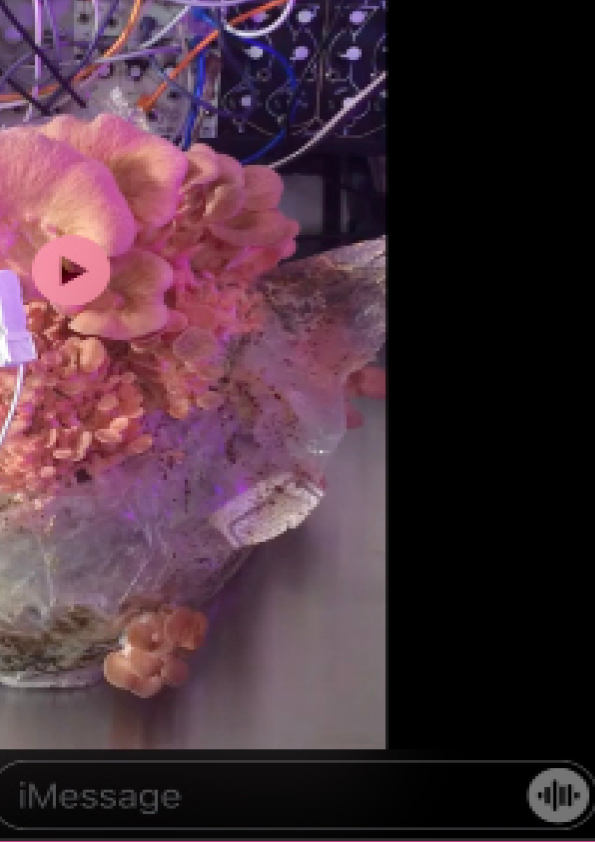No Touching: negotiating modes of digital connection
Billy Wolnicki
I traverse the weirdly warped interior of the MCA, my body in space replaced by laggy clicks and drags. Time all together slows down and speeds up. I move jarringly between works, through corridors veiled in black fabrics which I cannot touch. Jes Fan’s amorphous, corporeal blobs are rendered flat and tucked away, I miss them. When I am allowed to exist in physical proximity to institutionalised art again, I see them. I sit on the floor with them. Still one mustn’t touch, although some do, and are immediately advised to wash their hands — milk, blood, semen, melanin, sex hormones — yep, better wash your hands. Hannah Black says it’s absurd that it took a pandemic for us to realise we should wash our hands before touching each other. When applying AndroForte you are advised against skin to skin contact for at least six hours, lest your lover should also sprout a moustache. We are all permeable, after all. Things move through us, but at what cost?
I’ve never been particularly adept at the subtleties, or lack thereof, of Instagram, nor do I really understand the function of Facebook. At the beginning of isolation, my housemate and I would make one Triller video a fortnight to document our declining sanity. A Google calendar entry is prophecy. In one video I don a small plastic bag on my hand and wave it around enthusiastically to the addictive repetitiveness of “I love it” by Kanye West & Lil Pump until my housemate accidentally whacks me in the forehead while vigorously shaking her butt. We would watch these Triller videos in endless loops and fall into uncontrollable hysterics. Is it still narcissistic to find yourself funny if you’re dancing? Sadly, the videos were eventually diluted by the screenshotted depths of my camera roll. Lost, but not forgotten. Besides, our silly pixels will forever dance in some metaphoric cloud.
Around the same time, my relative disinterest towards social
media mutated into inescapable anxiety. The digital realm I had access to had become a claustrophobic echo chamber — I couldn’t keep up, things moved through me faster than I could process. I pressed my finger on the screen and lingered on the icons until they quivered, finally ejecting them from my reality with the tap of a tiny x.
Information overload is hardly a contemporary sentiment, and multitudes of thinkers, writers, and artists have responded to or engaged with this concept. Paul Stephens succinctly describes information overload as “a range of phenomena relating to the limits of cognition, perception, and memory (both personal and collective)”, though Stephens cautions against erring too closely to claims of technological determinism, the belief that autonomous technology shapes social relations.
Technology has agency, technology has actors, and technology, specifically social media, has immense potential in the right hands. This is especially evident within the ever-evolving spheres of activism and community building. It goes without saying that the current traction of the Black Lives Matter movement has been largely galvanised by the accessibility of social media. In a more specific and localised context, the #StandWithTess campaign expanded its reach primarily via Instagram as posters around campus were torn down.
As much as I want to believe in the power of the printed press I recognise its limitations, particularly during a time when all things passed between bodies are potential health risks. Print was once the détourned tool of the proletariat, now it’s the algorithm. Still, there is something both exhaustive and exhausting about social media.
My retreat was in part due to my feeling overwhelmed, but more so, it was because I couldn’t navigate social media in a way that allowed me to form connection. This is not to say that community cannot be found and built via social media, only that I didn’t know how to do it without becoming riddled with anxiety. The web for me was fragmented, I’d follow a sticky thread only to find a chasm.


Shoshana Zuboff speaks about the affective nature of surveillance capitalism on our corporeal and psychic selves. Behavioural modification technologies “nudge, tune, and herd our behaviours.” In short, information technologies, vis-à-vis social media, for example, have direct implications on our bodies and how we move with them through the world. Still, technology is not some disembodied spectre, it has agents, with agendas. Jodi Dean uses the term “Communicative Capitalism” to describe the way that “Linguistic, affective, and unconscious being-together [...] ha[s] been co-opted for capitalist production.” Not only is our everyday internet usage traced and churned into the cogs of big data, but our online communicative processes have also been subsumed.
Communication under Communicative Capitalism is no longer discursive, it is accumulative. As Dean writes, “The idea of a message as something sent by a speaker to a receiver in order to elicit a response [...] no longer holds. Messages are now contributions to circulating content.” Sharing, forwarding, retweeting, reposting, liking — these are all accumulative gestures, no one is speaking back to them. Perhaps this explains why using social media often feels like propelling yourself into a lonely albeit densely populated void. It is the anxiety of being seen, but not responded to. It’s like the internet is your crush, and they’ve left you on read.
After Black Lives Matter protests in Philadelphia, the FBI used Instagram, Etsy, and LinkedIn to track down a protestor accused of setting a police car on fire. They were effectively identified and apprehended via the data trails of their labour and spending. We know what surveillance capitalism looks like, how it overtly and covertly oversees, stifles, nudges, contorts and contains bodies to turn a profit.
Zuboff argues that in the last 20 years, digital technology has been “hijacked by an economic logic.” She says that at its conception we believed that it would be emancipatory and empowering — perhaps it still can be. What might a negation of surveillance capitalism look like? Or at the very least, could it be imbued with a conscience? We might look to notions of data dignity, in which one is compensated for or otherwise owns their data; or counter-surveillance technologies such as the iOS shortcut which wipes metadata from protest images. I don’t think a call to smash your iPhone and live off the grid is the answer.
My disillusionment with and subsequent departure from social media points to a certain privilege inherent in opting out. Ignorance is bliss, sure, but ignorance isn’t an option for everyone. Some people depend on support networks and information systems they wouldn’t have access to without social media. More broadly, a declaration of indifference or apoliticality presupposes that your very existence is not inherently political, whether you like it or not.
So I have to ask, how can I care for myself and others? What are alternative ways to stay informed? What’s your email address? What does longevity look like? For me right now, digital activism manifests in pixelated faces frozen in the midst of discourse, disembodied voices, sharing PDFs via dropbox, collaborative google docs, voice memos, screenshots, long contemplations, awkward zoom goodbyes, lengthy email chains, reading, writing, speaking, listening. I’ve found modes of being online that work for me, they are for the most part collective and discursive. It is a digitised modality that moves through my body like an ouroboros — wholesome and infinite. It also feels to me like a blob, amorphous and permeable. Without edges, we can revolutionise to our heart’s content.



